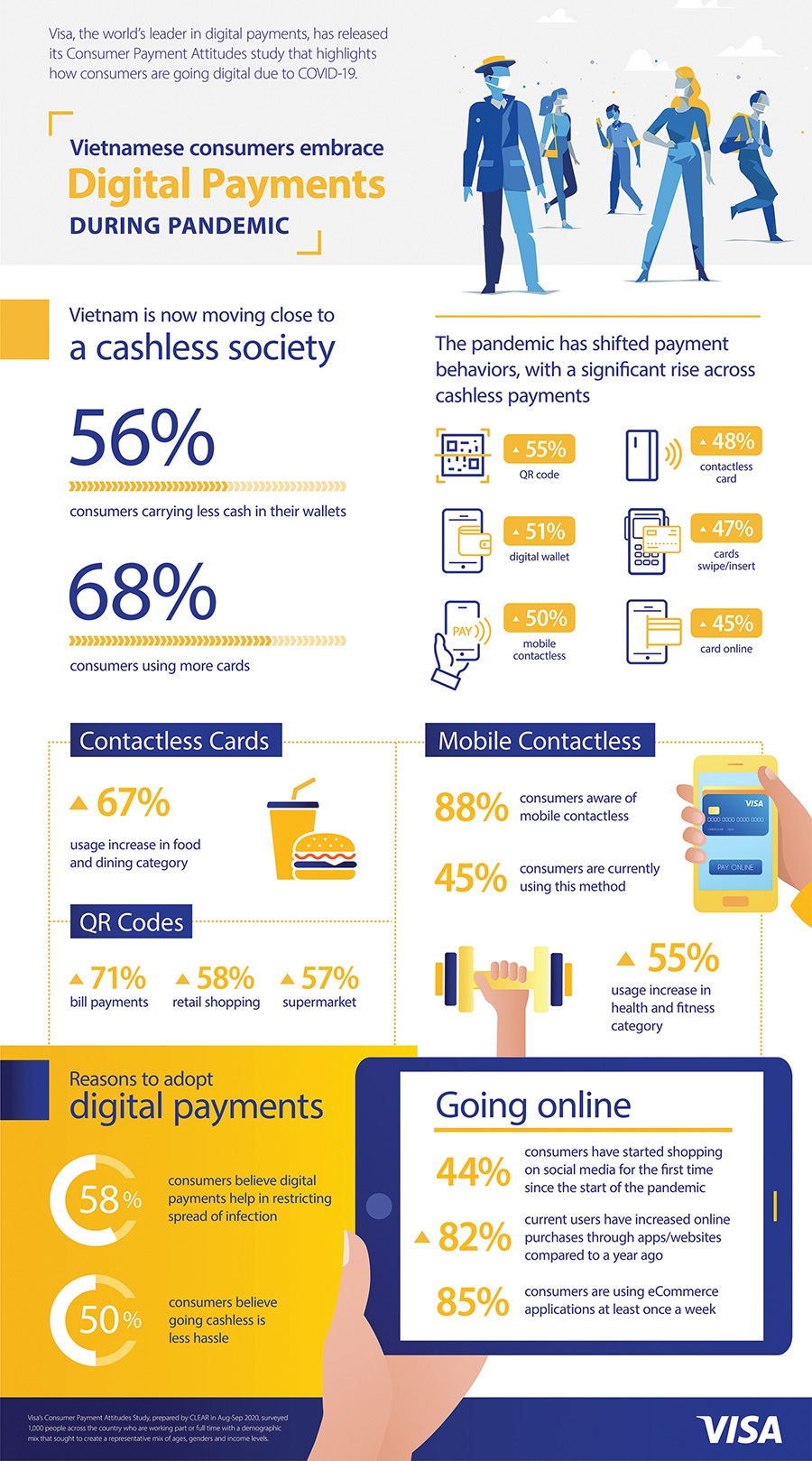Visa survey spots momentum for cashless payments
What do you think are the most important findings of the latest Consumer Payment Attitudes study?
 |
| Dang Tuyet Dung, Visa country manager for Vietnam and Laos |
The Visa Consumer Payment Attitudes survey is an annual study meant to understand the payment behaviours of consumers in key markets when it comes to digital payments, digital banking, and the future of commerce.
With COVID-19 having shaken the world, this study dives into how it has altered lives and payment behaviours to forecast what a post-pandemic world will look like.
The survey was conducted amongst 1,000 consumers in Vietnam and aims to uncover insights and trends in the industry as well as compare and call out interesting differences across segments.
One of the key findings is that the use of digital wallets, contactless payments via cards and smartphones, and QR code payments have all risen sharply during the pandemic. Specifically, contactless cards are leading the way in the food and dining category, with 67 per cent of consumers having increasingly used this method in 2020. Payments via QR codes have also soared during the pandemic, expanding the increasing impact on day-to-day categories such as bill payments (71 per cent), retail shopping (58 per cent), and supermarkets (57 per cent).
Vietnamese consumers have quickly adopted new ways of paying that do not involve physical contact such as tapping to pay. As confirmation of this, mobile contactless payments have gained in popularity, with the main spikes being seen in transactions for health and fitness sector (55 per cent). In total, 88 per cent of consumers are aware of mobile contactless payments and 45 per cent are currently adopting this method.
How is the COVID-19 pandemic shifting consumer behaviours?
Since the outbreak, the shop-and-pay habits of Vietnamese consumers have changed considerably as people desire safer, more convenient shopping experiences.
Before the pandemic, Vietnamese people were spending 3.1 hours a day online, but during social distancing that number skyrocketed to 4.2 hours a day at its peak. This reinforces statistics from Visa’s study that find 85 per cent of consumers are using e-commerce applications on their smartphones to pay for goods and services at least once a week, and 44 per cent have started shopping through social media channels for the first time since the start of the pandemic.
Given the booming e-commerce demand, we are seeing more first-timers adopting contactless payments and more companies shifting to digital, and this trend is likely to continue. Driving this transition from cash to alternative payments are security and convenience. According to Visa’s study, 58 per cent of respondents said the safety of digital versus cash is the main rationale behind their decisions to switch, and more than half (56 per cent) citing less hassle.
The willingness to switch is testament to how much our efforts to invest in new technologies have been appreciated by consumers, and their confidence in the convenience and security cashless payments have to offer.
How should businesses catch up with the changes?
As COVID-19 drives a surge in local and cross-border e-commerce, several companies have increased advertising on online platforms. The crisis has created some opportunities for online businesses. However, to capitalise on this trend, Vietnamese companies need to change their business models to join the online platforms sustainably. Our advice for local firms is to prepare specific knowledge about digital marketing and payments to step up their game in both local and overseas e-commerce markets.
To do business online, they need to focus on important aspects like building their reputation and keeping their commitment about products and services. They can also partner with global digital payment providers to provide a seamless digital payment experience for consumers. Through data analysis, Visa can help Vietnamese companies to keep abreast of consumer behaviour and market trends to develop better business strategies.
With regards to small- and medium-sized enterprises (SMEs), which account for a large proportion in Vietnam, they can face some difficulties in moving to online platforms. However, due to their small scale, they can make decision quicker as well as change their operation structure to adapt to the evolving business environment. At Visa, we are currently teaming up with tech and e-commerce partners such as Now, Shopee, and NextTech to deliver new payment solutions, promotions, and training for Vietnamese SMEs to facilitate their online businesses.
What opportunities do you see to promote cashless payment in Vietnam?
Despite the negative impact, the COVID-19 pandemic has been changing the awareness of consumers toward cashless payment. An increasing number of customers have adopted such payments for the first time for several reasons. Specifically, the top benefits of going cashless are the security it provides, as cash is easily lost or stolen, as well as convenience. As consumers are becoming more mindful of their spending, cashless payment solutions can help them keep track of their budget efficiently.
At Visa, we also worked with stakeholders to launch a multitude of programmes for small business owners and support them expand to digital platforms. While Where You Shop Matters enabled SMEs to develop their online presence on popular e-commerce sites, the latest initiative Google Retail University in partnership with the Vietnam E-commerce Association and Google offered an educational series involving digital and logistics solutions from Visa, Sapo, Haravan, EMS, and Vietnam Post, among others. This series has seen outstanding outcomes with 2,000 participants, 60 per cent of whom say it has helped them grow their business, with orders rising up to 56.7 per cent and operation efficiency 63.3 per cent.
The pandemic has also been a driving force for Vietnam’s cashless payment industry. In line with consumer’s strong belief about a cashless society, Vietnam’s cashless payment industry will be big due to the fast-paced technology advances and Visa’s unwavering commitment to building a new digital payment platform here.
Visa will continue to communicate the benefits of a cashless society to Vietnamese consumers. Our plan is to deploy new payment technologies for everyone. The Vietnamese public are quick to pick up on the latest innovations, making this an exciting market for the digital economy to thrive.
 |
What the stars mean:
★ Poor ★ ★ Promising ★★★ Good ★★★★ Very good ★★★★★ Exceptional
Related Contents
Latest News
More News
- VIB named Best Customer Satisfaction Bank in Vietnam 2025 (December 26, 2025 | 16:40)
- Visa and Techcombank win AmCham’s 2025 ESG Tech Innovation Award for Eco Card (December 09, 2025 | 12:16)
- Visa brings tap-to-ride payments to Hanoi Metro Line 2A (December 05, 2025 | 17:35)
- Cross-border QR payments launched for Chinese tourists (December 03, 2025 | 19:12)
- VIB honoured by JP Morgan with 2025 US Dollar Clearing Elite Quality Recognition Award (December 02, 2025 | 17:04)
- Home Credit Vietnam brings financial literacy closer to women and students (November 20, 2025 | 11:25)
- MB partners with Visa, KOTRA to launch new MB Visa Hi BIZ card (November 20, 2025 | 11:24)
- VPBank upgrades core banking with Temenos and Systems Limited (November 14, 2025 | 17:54)
- CPO Home Credit shares how to build an AI-driven but human-centric workplace (October 30, 2025 | 09:56)
- VIB hits $267.4 million in pre-tax profit over first nine months (October 29, 2025 | 12:12)

 Tag:
Tag:



















 Mobile Version
Mobile Version